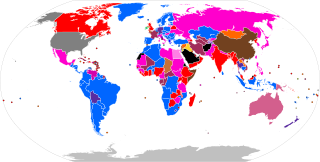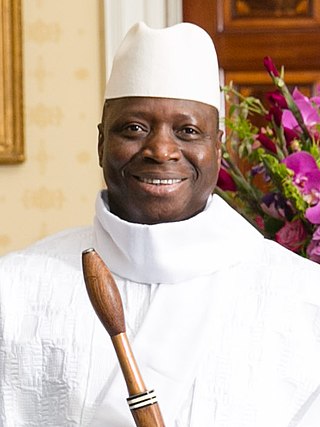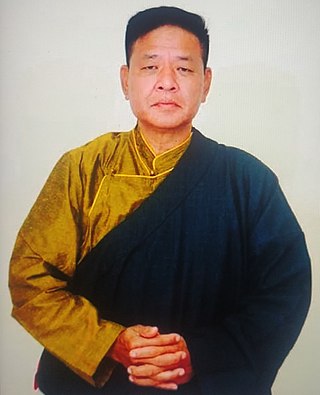Related Research Articles

An election is a formal group decision-making process by which a population chooses an individual or multiple individuals to hold public office.
Proportional representation (PR) refers to a type of electoral system under which subgroups of an electorate are reflected proportionately in the elected body. The concept applies mainly to political divisions among voters. The essence of such systems is that all votes cast – or almost all votes cast – contribute to the result and are effectively used to help elect someone – not just a bare plurality, or (exclusively) the majority – and that the system produces mixed, balanced representation reflecting how votes are cast.

In a first-past-the-post electoral system, formally called single-member plurality voting (SMP) when used in single-member districts or informally choose-one voting in contrast to ranked voting, or score voting, voters cast their vote for a candidate of their choice, and the candidate who receives the most votes wins even if the top candidate gets less than 50%, which can happen when there are more than two popular candidates.
Compulsory voting, also called universal civic duty voting or mandatory voting, is the requirement that registered voters participate in an election. In practice, one only needs to check-in at a polling place, submit a blank ballot, or provide an excused reason, such as disability, illness, age, travel, a natural disaster, or religious objections.

The Christian Democratic People's Party of Switzerland, also called the Christian Democratic Party, Democratic People's Party and Swiss Christian Democratic Party, PCD), was a Christian-democratic political party in Switzerland. On 1 January 2021, it merged with the Conservative Democratic Party of Switzerland (BDP/PBD) to form The Centre, which now operates at the federal level. The Christian Democratic People's Party will continue to exist at the cantonal level as individual local and regional parties determine their status.

In political science, voter turnout is the participation rate of a given election. This is typically either the percentage of registered voters, eligible voters, or all voting-age people. According to Stanford University political scientists Adam Bonica and Michael McFaul, there is a consensus among political scientists that "democracies perform better when more people vote."

Open list describes any variant of party-list proportional representation where voters have at least some influence on the order in which a party's candidates are elected. This is as opposed to closed list, which allows only active members, party officials, or consultants to determine the order of its candidates and gives the general voter no influence at all on the position of the candidates placed on the party list.

Elections in The Bahamas take place in the framework of a parliamentary democracy. Since independence, voter turnout has been generally high in national elections, with a low of 87.9% in 1987 and a high of 98.5% in 1997. The current Prime Minister is The Hon. Philip Davis.

Elections in Lithuania are held to select members of the parliament, the president, members of the municipal councils and mayors, as well as delegates to the European Parliament. Lithuanian citizens can also vote in mandatory or consultative referendums.

Elections in Turkey are held for six functions of government: presidential elections (national), parliamentary elections (national), municipality mayors (local), district mayors (local), provincial or municipal council members (local) and muhtars (local). Apart from elections, referendums are also held occasionally.
Voting in Switzerland is the process by which Swiss citizens make decisions about governance and elect officials. The history of voting rights in Switzerland mirrors the complexity of the nation itself. The polling stations are opened on Saturdays and Sunday mornings but most people vote by post in advance. At noon on Sunday, voting ends and the results are usually known during the afternoon.
A free and fair election is defined by political scientist Robert Dahl as an election in which "coercion is comparatively uncommon". A free and fair election involves political freedoms and fair processes leading up to the vote, a fair count of eligible voters who cast a ballot, and acceptance of election results by all parties. An election may partially meet international standards for free and fair elections, or may meet some standards but not others.

There are five types of elections in the United Kingdom: elections to the House of Commons of the United Kingdom, elections to devolved parliaments and assemblies, local elections, mayoral elections, and Police and Crime Commissioner elections. Within each of those categories, there may also be by-elections. Elections are held on Election Day, which is conventionally a Thursday, and under the provisions of the Dissolution and Calling of Parliament Act 2022 the timing of general elections can be held at the discretion of the prime minister during any five-year period. All other types of elections are held after fixed periods, though early elections to the devolved assemblies and parliaments can occur in certain situations. The five electoral systems used are: the single member plurality system (first-past-the-post), the multi-member plurality, the single transferable vote, the additional member system, and the supplementary vote.
A voting advice application or voting aid application (VAA) or vote matcher or vote compass or election compass is a Web application that helps voters find a candidate or a party that stands closest to their preferences. VAAs are a new phenomenon in modern election campaigning.

An electoral system or voting system is a set of rules that determine how elections and referendums are conducted and how their results are determined. Electoral systems are used in politics to elect governments, while non-political elections may take place in business, non-profit organisations and informal organisations. These rules govern all aspects of the voting process: when elections occur, who is allowed to vote, who can stand as a candidate, how ballots are marked and cast, how the ballots are counted, how votes translate into the election outcome, limits on campaign spending, and other factors that can affect the result. Political electoral systems are defined by constitutions and electoral laws, are typically conducted by election commissions, and can use multiple types of elections for different offices.

Parliamentary elections were held in the Gambia on 29 March 2012. The ruling Alliance for Patriotic Reorientation and Construction (APRC) won 43 of the 48 elected seats.

Parliamentary elections were held in Burkina Faso on 2 December 2012. They were the first elections held since the National Assembly dissolved the National Electoral Commission in 2011, following fraud allegations concerning the 2010 presidential elections. Municipal elections for over 18,000 councillors were held simultaneously. The elections were held amidst a period of political uncertainty, following protests against President Blaise Compaore's regime.
The mathematical theory of democracy is an interdisciplinary branch of the public choice and social choice theories conceptualized by Andranik Tangian. It operationalizes the fundamental idea to modern democracies – that of political representation, in particular focusing on policy representation, i.e. how well the electorate's policy preferences are represented by the party system and the government. The representative capability is measured by means of dedicated indices that are used both for analytical purposes and practical applications.

The Tibetan Election Commission of the Central Tibetan Administration has confirmed that the procedure set for the preparation of the next general elections of 2021 is underway, according to a statement by Wangdu Tsering Pesur, chief electoral commissioner.
The Third Vote is an election method proposed within the mathematical theory of democracy by Andranik Tangian. It is aimed at emphasizing issues of policy over personality The Third Vote has to-date only been used experimentally in student elections.
References
- ↑ Voting advice application smartvote, checked February 21, 2015
- ↑ eDemocracy in Switzerland: Smartvote - a personal report (in German only), checked February 21, 2015
- ↑ Swiss Election Studies Selects, checked February 21, 2015
- ↑ NCCR Democracy, checked February 21, 2015
- ↑ Politools – Political Research Network, checked February 21, 2015